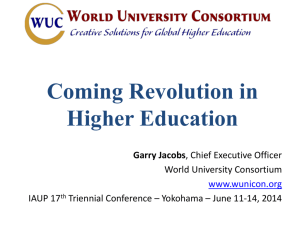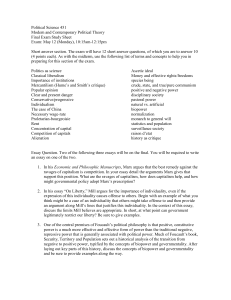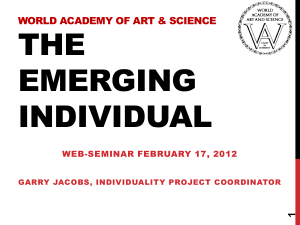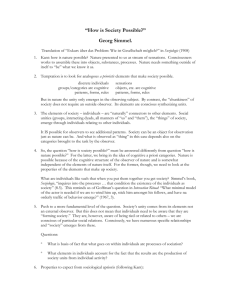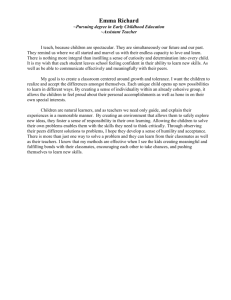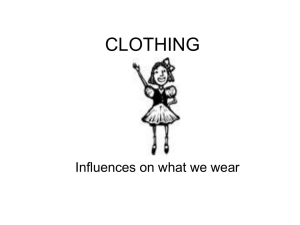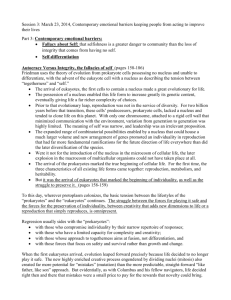IA-17 Individuality & Individuation * Jacobs
advertisement
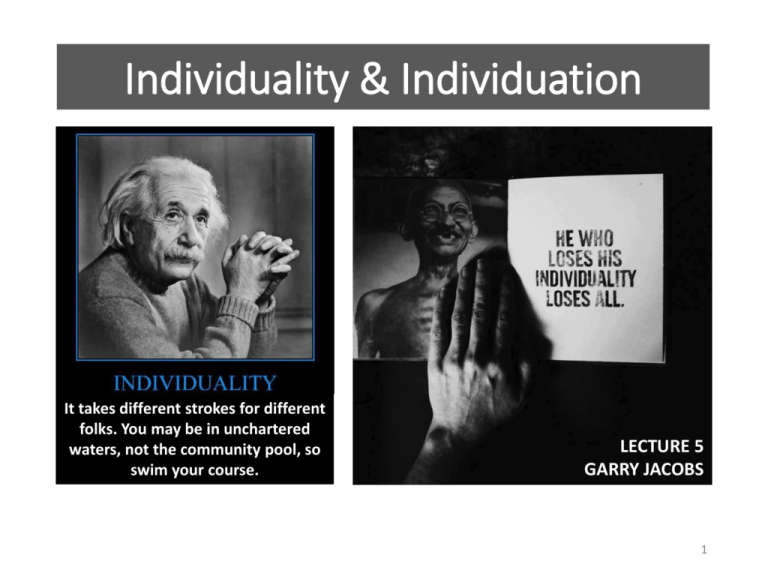
Individuality & Individuation It takes different strokes for different folks. You may be in unchartered waters, not the community pool, so swim your course. LECTURE 5 GARRY JACOBS 1 A Half-acre of Jasmine He saw what others did not see He dared to risk the little he had His success evoked imitation Imitation spurred him to greater innovation Pursuing his own dream, he raised the whole village The essence of individuality is to rise above social convention and the sense of limits 2 What is Individuality? • To think beyond conventional wisdom • To conceive of accomplishing what no one else has or believes can be accomplished • To rely on one’s own understanding, thinking, judgment, conviction • To decide for oneself, do what is right, stand by what we believe • To act according to one’s highest values and convictions • To make a unique contribution to society that changes something fundamental 3 J. P. Morgan – A One Man Federal Reserve At the turn of the 20th Century there were 21,000 banks in US functioning without any coordination or regulation or common pool of reserves Panic of 1907 rivalled in magnitude and intensity the Great Crash of 1929 No Federal Reserve, no global banking system, no strong federal government determined to stem it Entire burden fell on one man’s capacities, strength & resourcefulness Critical challenge was to identify which banks could be saved and to raise emergency funds to support them He persuaded banks to pool $25 million to restore confidence just in time His personality served the function of a national institution His actions directly led to the creation of the US Federal Reserve “Resistance to the organized mass can be effected only by the man who is as well organized in his individuality as the mass itself.” – Carl Jung 5 Definitions INDIVIDUALISM INDIVIDUAL A single member of the society, a separate person An outlook based on self-reliance, independence, and very often selfcentred egoism; a social philosophy favouring individual freedom over state control INDIVIDUALITY That which does not depend on social authority or tend toward social conformity for its own sake; the capacity for original inspiration, creativity, uniqueness of expression INDIVIDUATION The process by which individuality develops in a person 6 Evolution of Individuality History testifies to the existence of exceptional individuals who changed the world from the time of Moses, Buddha, Socrates, Confucius and Christ. There have always been individuals. But societies have not always valued the development of individuality Conformity to social tradition was the rule, individuality the rare exception. Tradition conceived human beings in social terms and the natural life of men as institutionalized life of the society. To, Aristotle, a citizen belonged to the polis, not to himself. 7 INDIVIDUALISM Birth of Individualism in Hellenic Greece A great turning point in history The inner life was valued as the genuine life The individual became the natural unit, no longer the group Ethics became the ethics of the individual – value of privacy, ideas of freedom Freedom for the individual became the ideal Education of the intellectual became important 8 Italian Renaissance Rediscovery of the Individual • Freedom of self-expression gained precedence over conformity • Individual faith was rediscovered – “Know yourself as a way to God” • Individual conscience won out over church authority • Inner repentance, individual confession, individual salvation, and individual interpretations of the gospel gained legitimacy • Classical emphasis on impersonality in art gave way to portrayal of personal details, individualized expressions and deepest feelings • Personal names became more common, stressing individual identity rather than family lineage or place of origin • The autobiography and attention to personal appearance and bathing came into vogue after centuries of ascetic neglect • The ideal of romantic love appeared in court literature 9 Rise of Individuality The rise of individuality to the central place in Western culture • Printing Press • Protestant Reformation • The Enlightenment • Rise of Parliament • Declaration of Independence • French Revolution • Shift from property to money as the basis for wealth • Spread of Education • Universal suffrage • Rise of the Middle Class • “Century of the common man” • Universal human rights 10 Process of Individuation – Carl Jung DEVELOPMENT of consciousness out of the original state of psychological identity with the collective TRANSFORMATION of personality to reach a higher level of consciousness DIFFERENTIATION by which an unformed social personality becomes aware of his own unique innate potentials 11 Relationship of Individual & Society - Jung The Individual is one who chooses not to be limited by collective norms The Individual does not live an isolated, separate existence, but as a pre-eminent member of the collective Society is essential for human existence and for the flowering of Individuality The Individual is indispensable for the development of the society The Individual gives conscious expression to the needs and aspirations of the society through his actions. 12 Individuation – Abraham Maslow “It looks as if there were a single ultimate goal for mankind, a far goal toward which all persons strive. This is called variously by different authors self-actualization, self-realization, integration, psychological health, individuation, autonomy, creativity, productivity, but they all agree that this amounts to realizing the potentialities of the person, that is to say, becoming fully human, everything that person can be.” 13 Self-actualized Individual – Maslow A self-actualized Individual is one who becomes aware of his potential and chooses to aspire for what he thinks is right with self-confidence and self-respect, even if it requires him to break with social conventions The self-actualized Individual is not ego-centric and selfish His central characteristic is uniqueness The Individual and the Collective are complementary: the Individual lives in harmony with himself and the collective. 14 E. E. CUMMINGS To be nobody but yourself in a world which is doing its best day and night to make you like everybody else means to fight the hardest battle which any human being can fight and never stop fighting. 15 Conformity, Rebellion & Individuality • Conformity is submission to the authority of social convention, whether imposed from outside or conditioned within • Non-conformity is the capacity to resist pressure to adopt society’s norms • Rebellion is a reaction against the pressure to conform – negative conformity • Individuality is the capacity to act freely, unconstrained by inner conditioning or external social pressure, according to one’s highest understanding, ideals, values and creative inspiration • The individual is neither self-centred nor rebellious, but operates by a personal value system 16 STEVE JOBS “Your time is limited, so don’t waste it living someone else’s life. Don’t be trapped by dogma — which is living with the results of other people’s thinking. Don’t let the noise of others’ opinions drown out your own inner voice. And most important, have the courage to follow your heart and intuition. They somehow already know what you truly want to become. Everything else is secondary.” 17 Individuality & Authority Individuality involves an internalization of authority – a shift from the authority imposed from outside or by conditioning to free choice based on one’s own understanding, beliefs and values The individual internalizes society's values as his own or rejects them in favor of others based on his own judgment and choice without compulsion The individual dares to question existing norms and beliefs and dares to think or believe what is either impossible or unacceptable to society Individuals are able to see that the unrealized is not necessarily unrealizable 18 Carl Rogers on Individuality • Individuality is the ideal human condition – the fully functioning Individual • Self-aware, open to experience, avails of life’s opportunities • Makes conscious choices without being inhibited by restrictions • Refuses to conform to the collective urge. Dares to express his uniqueness. • Regulates and takes total responsibility for his actions, without seeking external authority • Guides his own life in a manner that's both personally and socially constructive • Harmonious in relationship with the collective and accepts social responsibility • Trusts his own inner urges and intuitions • Fulfils his potentialities by making his own decisions with self-reliance, autonomy, courage and persistence • Is neither selfish nor egoistic • He lives wholly and freely in each moment “Individuation is an on going process that is an end in itself, the most profound truth about man.” 19 Types of Individuality PHYSICAL • Explorer • Pioneer • Inventor VITAL • Entrepreneur • Leader MENTAL • Scientist • Poet/Artist • Original Thinker 20 Leonardo da Vinci – Renaissance Polymath • Unquenchable curiosity and feverishly inventive imagination • One of the greatest painters of all time and perhaps the most diversely talented person ever to have lived. • Painter, sculptor, architect, musician, mathematician, engineer, inventor, anatomist, geologist, cartographer, botanist, and writer. • Anatomical studies combining science and art • Invented solar power, adding machine, flying machine, parachute, helicopter, tank, cannon and single span 220m bridge 21 Creativity & Objectification All accomplishment and creativity are by a process of objectification • • • • • • • • • Leonardo’s Mona Lisa & Last Supper Washington – Democratic America Morgan - Stable Economy Gandhi - Independent India Marriott – Vibrant Company Jobs – Perfect Products Austen’s Pride & Prejudice Beethoven’s Ninth Symphony Rodin’s Thinker The process of realizing one’s potential in form releases JOY. It is self-rewarding 22 Creative Individual taps unseen social potentials Morgan united competitors for cooperative action FDR tapped the faith, courage & confidence of the American people Jobs unified computer, Walkman & ecommerce with music industry Google unified user search needs with advertiser marketing 23 Experience, Growth, Personality & Individuality Experience is the raw material for all human progress Experience presents challenges that draw out unformed human potentials as a sculptor chisels a statue out of stone Growth is the result of the interaction between the individual and the physical, social and mental environment Personality organizes that experience Individuality is its unique, creative, living spiritual essence 24 What is the source of the individual’s power? • The power of the individual IS the power of society • His energy comes from the society, the same way the politicians and entertainer’s energy comes from the support and admiration of his followers • He acquires that power by attuning or identifying himself with the aspirations and urges of the society and giving expression to them • The entire society can express its power through one individual 25 Individual & Universe ALAN WATTS “Every individual is a unique manifestation of the Whole, as every branch is a particular outreaching of the tree. To manifest individuality, every branch must have a sensitive connection with the tree, just as our independently moving and differentiated fingers must have a sensitive connection with the whole body. Differentiation is not separation. The head and the feet are different, but not separate, and though man is not connected to the universe by exactly the same physical relation as branch to tree or feet to head, he is nonetheless connected— and by physical relations of fascinating complexity.” 26 Evolution of Individuality – Rollo May • Human development is a continuum of differentiation from the "mass" toward freedom and integration as an individual • All evolution can be described as the process of differentiation of the part from the whole, the individual from the mass, with the parts then relating to each other on a higher level 27 Is humanity evolving? Charles Fourier, French philosopher envisioned a future in which the world has 37 million poets equal to Homer, 37 million mathematicians equal to Newton and 37 million dramatists equal to Molière 28
